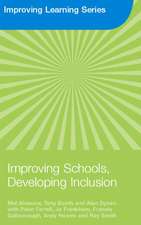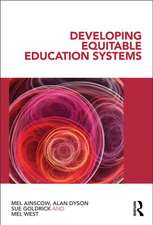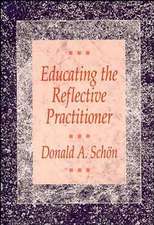Struggles for Equity in Education: The selected works of Mel Ainscow: World Library of Educationalists
Autor Mel Ainscowen Limba Engleză Hardback – 6 iul 2015
The readings have been chosen to illustrate the changes that have occurred in Ainscow’s thinking and practices and a short introduction is provided for each chapter that is intended to help readers to understand the significance of what is presented and how this relates to other chapters in the book. The writings in this text reinforce the idea that the promotion of equity in schools is essentially a social process that has to occur within particular contexts.
| Toate formatele și edițiile | Preț | Express |
|---|---|---|
| Paperback (1) | 333.88 lei 3-5 săpt. | +22.15 lei 10-14 zile |
| Taylor & Francis – 17 dec 2016 | 333.88 lei 3-5 săpt. | +22.15 lei 10-14 zile |
| Hardback (1) | 1218.89 lei 6-8 săpt. | |
| Taylor & Francis – 6 iul 2015 | 1218.89 lei 6-8 săpt. |
Din seria World Library of Educationalists
-
 Preț: 323.07 lei
Preț: 323.07 lei -
 Preț: 291.40 lei
Preț: 291.40 lei -
 Preț: 311.37 lei
Preț: 311.37 lei -
 Preț: 339.37 lei
Preț: 339.37 lei -
 Preț: 373.56 lei
Preț: 373.56 lei -
 Preț: 333.88 lei
Preț: 333.88 lei -
 Preț: 306.24 lei
Preț: 306.24 lei - 18%
 Preț: 1053.47 lei
Preț: 1053.47 lei -
 Preț: 476.60 lei
Preț: 476.60 lei -
 Preț: 480.46 lei
Preț: 480.46 lei - 18%
 Preț: 1000.27 lei
Preț: 1000.27 lei - 18%
 Preț: 1059.45 lei
Preț: 1059.45 lei -
 Preț: 397.88 lei
Preț: 397.88 lei - 18%
 Preț: 1058.65 lei
Preț: 1058.65 lei - 16%
 Preț: 242.50 lei
Preț: 242.50 lei - 18%
 Preț: 1166.01 lei
Preț: 1166.01 lei - 25%
 Preț: 851.46 lei
Preț: 851.46 lei -
 Preț: 404.67 lei
Preț: 404.67 lei - 13%
 Preț: 303.61 lei
Preț: 303.61 lei -
 Preț: 482.35 lei
Preț: 482.35 lei - 26%
 Preț: 847.31 lei
Preț: 847.31 lei - 18%
 Preț: 1000.27 lei
Preț: 1000.27 lei -
 Preț: 441.54 lei
Preț: 441.54 lei - 18%
 Preț: 1171.89 lei
Preț: 1171.89 lei - 18%
 Preț: 1328.97 lei
Preț: 1328.97 lei -
 Preț: 438.65 lei
Preț: 438.65 lei -
 Preț: 402.98 lei
Preț: 402.98 lei - 18%
 Preț: 1275.71 lei
Preț: 1275.71 lei - 18%
 Preț: 1225.22 lei
Preț: 1225.22 lei - 22%
 Preț: 294.60 lei
Preț: 294.60 lei - 26%
 Preț: 822.54 lei
Preț: 822.54 lei - 18%
 Preț: 1166.01 lei
Preț: 1166.01 lei -
 Preț: 478.41 lei
Preț: 478.41 lei - 26%
 Preț: 765.01 lei
Preț: 765.01 lei - 18%
 Preț: 1222.36 lei
Preț: 1222.36 lei -
 Preț: 441.96 lei
Preț: 441.96 lei - 18%
 Preț: 1060.87 lei
Preț: 1060.87 lei - 25%
 Preț: 822.91 lei
Preț: 822.91 lei - 15%
 Preț: 444.50 lei
Preț: 444.50 lei - 26%
 Preț: 822.36 lei
Preț: 822.36 lei
Preț: 1218.89 lei
Preț vechi: 1486.45 lei
-18% Nou
Puncte Express: 1828
Preț estimativ în valută:
233.26€ • 242.15$ • 194.50£
233.26€ • 242.15$ • 194.50£
Carte tipărită la comandă
Livrare economică 22 martie-05 aprilie
Preluare comenzi: 021 569.72.76
Specificații
ISBN-13: 9781138918863
ISBN-10: 1138918865
Pagini: 240
Ilustrații: 2 black & white tables, 2 black & white line drawings
Dimensiuni: 156 x 234 x 18 mm
Greutate: 0.48 kg
Ediția:1
Editura: Taylor & Francis
Colecția Routledge
Seria World Library of Educationalists
Locul publicării:Oxford, United Kingdom
ISBN-10: 1138918865
Pagini: 240
Ilustrații: 2 black & white tables, 2 black & white line drawings
Dimensiuni: 156 x 234 x 18 mm
Greutate: 0.48 kg
Ediția:1
Editura: Taylor & Francis
Colecția Routledge
Seria World Library of Educationalists
Locul publicării:Oxford, United Kingdom
Public țintă
ProfessionalCuprins
1. Introduction: making sense of my struggles
2. Rethinking the agenda
Ainscow, M. (1999) Understanding the development of inclusive schools. London: Routledge (Chapter 2: Learning from experience)
3. An objectives approach
Ainscow, M. and Tweddle, D.A. (1979) Preventing Classroom Failure: An Objectives Approach. London: Wiley/Fulton (Chapter 1: Peter; and Chapter 2: Teaching slow learners)
4. Towards inclusive education
Ainscow, M. and Tweddle, D.A. (1988) Encouraging Classroom Success. London: Fulton (Chapter 1: Success in the classroom)
5. Improving the quality of education for all
Ainscow, M. and Hopkins, D. (1992) Aboard the 'moving school'. Educational Leadership 50(3), 79-81
6. Learning from differences
Ainscow, M. (2000) Reaching out to all learners: some lessons from international experience. School Effectiveness and School Improvement, 11, (1), 1-9.
7. The Index for Inclusion
Ainscow, M. (2002) Using research to encourage the development of inclusive practices. In: P. Farrell and M. Ainscow (Eds.) Making Special Education Inclusive. London: Fulton.
8. Using action research
Ainscow, M., Booth, T. and Dyson, A. (2006) Inclusion and the standards agenda: negotiating policy pressures in England. International Journal of Inclusive Education. 10 (4–5), 295–308
.
9. Future directions for special schools
Ainscow, M. (2006) Towards a more inclusive education system: where next for special schools? In R. Cigman (ed.), Included or Excluded? The challenge of the mainstream for some SEN children. Routledge
10. Levers for change
Ainscow, M. (2005) Developing inclusive education systems: what are the levers for change? Journal of Educational Change 6(2), 109-124
11. Leadership and collaboration
Ainscow, M. and West, M. (eds.) (2006) Improving Urban Schools: Leadership and Collaboration. Open University Press (Chapter 12: Drawing the lessons)
12. Education for all
Ainscow, M. and Miles, S. (2008) Making Education for All inclusive: where next? Prospects, 37 (1), 15-34
13. The power of networking
Ainscow, M. (2010) Achieving excellence and equity: reflections on the development of practices in one local district over 10 years. School Effectiveness and School Improvement, 21 (1), 75-91
14. Using evidence to promote equity in schools
Ainscow, M., Dyson, A., Goldrick, S. and West, M. (2012) Making schools effective for all: rethinking the task. School Leadership and Management, 32(3), 1-17
15. Towards self-improving school systems
Ainscow, M. (2012) Moving knowledge around: strategies for fostering equity within educational systems. Journal of Educational Change 13(3), 289-310
16. Some final thoughts: where next?
2. Rethinking the agenda
Ainscow, M. (1999) Understanding the development of inclusive schools. London: Routledge (Chapter 2: Learning from experience)
3. An objectives approach
Ainscow, M. and Tweddle, D.A. (1979) Preventing Classroom Failure: An Objectives Approach. London: Wiley/Fulton (Chapter 1: Peter; and Chapter 2: Teaching slow learners)
4. Towards inclusive education
Ainscow, M. and Tweddle, D.A. (1988) Encouraging Classroom Success. London: Fulton (Chapter 1: Success in the classroom)
5. Improving the quality of education for all
Ainscow, M. and Hopkins, D. (1992) Aboard the 'moving school'. Educational Leadership 50(3), 79-81
6. Learning from differences
Ainscow, M. (2000) Reaching out to all learners: some lessons from international experience. School Effectiveness and School Improvement, 11, (1), 1-9.
7. The Index for Inclusion
Ainscow, M. (2002) Using research to encourage the development of inclusive practices. In: P. Farrell and M. Ainscow (Eds.) Making Special Education Inclusive. London: Fulton.
8. Using action research
Ainscow, M., Booth, T. and Dyson, A. (2006) Inclusion and the standards agenda: negotiating policy pressures in England. International Journal of Inclusive Education. 10 (4–5), 295–308
.
9. Future directions for special schools
Ainscow, M. (2006) Towards a more inclusive education system: where next for special schools? In R. Cigman (ed.), Included or Excluded? The challenge of the mainstream for some SEN children. Routledge
10. Levers for change
Ainscow, M. (2005) Developing inclusive education systems: what are the levers for change? Journal of Educational Change 6(2), 109-124
11. Leadership and collaboration
Ainscow, M. and West, M. (eds.) (2006) Improving Urban Schools: Leadership and Collaboration. Open University Press (Chapter 12: Drawing the lessons)
12. Education for all
Ainscow, M. and Miles, S. (2008) Making Education for All inclusive: where next? Prospects, 37 (1), 15-34
13. The power of networking
Ainscow, M. (2010) Achieving excellence and equity: reflections on the development of practices in one local district over 10 years. School Effectiveness and School Improvement, 21 (1), 75-91
14. Using evidence to promote equity in schools
Ainscow, M., Dyson, A., Goldrick, S. and West, M. (2012) Making schools effective for all: rethinking the task. School Leadership and Management, 32(3), 1-17
15. Towards self-improving school systems
Ainscow, M. (2012) Moving knowledge around: strategies for fostering equity within educational systems. Journal of Educational Change 13(3), 289-310
16. Some final thoughts: where next?
Notă biografică
Mel Ainscow is Professor of Education and Co-director of the Centre for Equity in Education at the University of Manchester, and Adjunct Professor at Queensland University of Technology, Australia. In the Queen’s 2012 New Year honours list he was made a CBE for his services to education. Currently he is leading Schools Challenge Cymru, the Welsh Government’s multi-million pound flagship programme to accelerate the rate of improvement across the country’s schools.
Descriere
Spanning Professor Ainscow’s accomplished 30 year international career in education, the texts in this book trace his efforts to find ways of fostering more equitable forms of education. This has involved a series of struggles as he has experimented with different approaches - in a variety of contexts - to find new possibilities for responding to learner diversity. The readings have been chosen to illustrate the changes that have occurred in Professor Ainscow’s thinking and practices and a short introduction is provided for each chapter that is intended to help readers to understand the significance of what is presented and how this relates to other chapters in the book.














